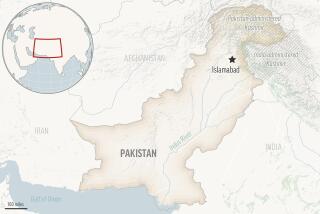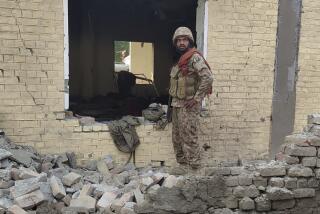Pakistan bombing kills 23, may be tied to Al Qaeda arrests
Islamabad, Pakistan — Police are investigating whether a twin suicide bombing at the home of a top paramilitary official that killed at least 23 people in Quetta on Wednesday is linked to the recent arrest of three top Al Qaeda operatives in the Pakistani city.
Brig. Farrukh Shahzad, deputy head of the Frontier Corps paramilitary force for Baluchistan province, survived the morning attack but his wife was killed, police officials in the southern city said. More than 50 people were injured in the blasts.
The attack began when a suicide bomber in a sport utility vehicle packed with explosives rammed his car into a convoy of Frontier Corps officers outside Shahzad’s house, triggering a massive explosion, police said. Moments later, a second attacker rushed into Shahzad’s house, hurling grenades before detonating his suicide bomb vest.
Shahzad was seriously injured in the attack, police said. Several senior Frontier Corps officers were killed or injured.
Police identified the suicide bomber on foot as Ahmad Gul, a 21-year-old Afghan refugee living in the northwestern Pakistan city of Peshawar. His identification card was found amid severed body parts at the blast site.
The Pakistani Taliban claimed responsibility for the attack, saying it was retaliation for the arrests of the three Al Qaeda operatives, according to Agence France-Presse.
On Monday, Pakistani military authorities announced the arrests of a senior Al Qaeda commander, Younis Mauritani, and two other senior operatives in Quetta. Officers with Baluchistan’s Frontier Corps took part in the arrests, which were led by agents with Pakistan’s Inter-Services Intelligence, the country’s primary intelligence agency. Leads provided by the CIA helped Pakistani agents and officers track down the men, Pakistani officials said.
Mauritani headed Al Qaeda’s international operations and had been planning attacks on a variety of U.S. economic interests, including gas and oil pipelines and hydroelectric dams, Pakistani officials said. He also had been planning to target American ships and oil tankers with speedboats filled with explosives.
Mauritani had been asked by Al Qaeda leader Osama bin Laden to focus on targets of economic importance to the United States, Europe and Australia, Pakistani military officials said.
In May, U.S. commandos killed Bin Laden in a raid on his compound in the Pakistani city of Abbottabad, just north of Islamabad, the capital.
Quetta, home to about 896,000 people and the capital of Baluchistan province, has long been used as sanctuary by Islamic militant groups, including top Afghan Taliban leaders waging a 10-year insurgency against U.S., NATO and Afghan security forces in neighboring Afghanistan. It also has been the scene of sectarian violence against minority Shiite Pakistanis, as well as attacks carried out by Baluchistan separatists.
Nasir Khan is a special correspondent.
More to Read
Sign up for Essential California
The most important California stories and recommendations in your inbox every morning.
You may occasionally receive promotional content from the Los Angeles Times.










